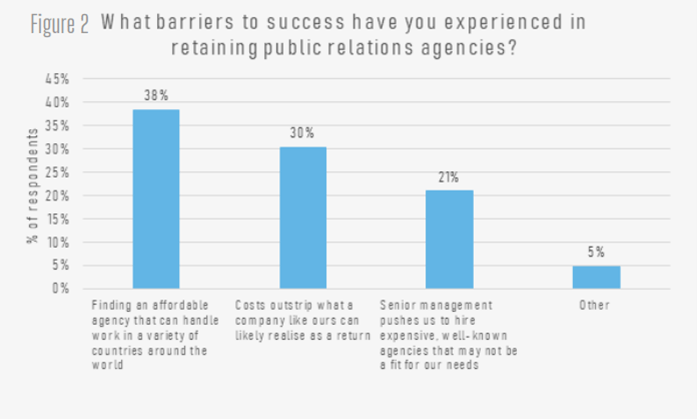Tokyo Olympics clarifies foreign spectator ban, Miami Beach declares state of emergency over spring break crowds, and Facebook makes first PR announcement on Clubhouse
Also: CDC relaxes physical distancing measures for schools, TikTok ‘aggressively banned’ violent videos in Myanmar, PR pros crave agencies with global reach, and more.
Hello, Communicators:
Global COVID-19 vaccine manufacturers face mounting criticism for neglecting to share their proprietary patents and technology more freely with other pharmaceutical manufacturers, particularly those in developing countries.
While a global vaccine technology-sharing pool was proposed to the World Health Organization (WHO) last year, no vaccine manufacturer has agreed to the program. Pfizer chief executive Albert Bourla called the concept “nonsense,” despite the WHO saying that limited, exclusive licensing of the vaccine tech is insufficient to address the current global health crisis.
“Drug companies are lobbying the Biden administration to block a push at the WHO by India, South Africa and about 80 other countries for a temporary waiver on patent protections for the new vaccines,” reports The Washington Post. “The pharmaceutical industry argues that innovation as well as vaccine quality and safety depend on maintaining exclusive intellectual property rights.”
When the world shut down just over a year ago, most brands and organizations did a solid job prioritizing the safety of customers and stakeholders over profits. As comms pros work to position their companies’ roles in the return to normalcy, every business decision gains an added level of scrutiny around whether it is best for the safety and wellbeing of stakeholders.
Communicators need be in the (virtual) room this year for every meeting about their organization’s operational decisions, ready to speak up should the optics of any business decision unwittingly communicate a callous or inhospitable response to health and safety.
Tokyo Olympics says foreign spectator ban is ‘giving clarity’ to potential travelers
Foreign spectators will not be permitted at the postponed Tokyo Olympics when the event kicks off in four months. The announcement came Saturday following an online meeting of the International Olympic Committee, the Japanese government, the Tokyo government, the International Paralympic Committee and local organizers.
In a recent survey, up to 80% of the Japanese public opposed holding the Olympics altogether, with a similar number opposing the presence of spectators from overseas.
“In order to give clarity to ticket holders living overseas and to enable them to adjust their travel plans at this stage, the parties on the Japanese side have come to the conclusion that they will not be able to enter into Japan at the time of the Olympic and Paralympic Games,” the Tokyo organizing committee said in a statement.
Organizers said 600,000 tickets were sold to fans from outside Japan. They have promised refunds, but this will be determined by so-called Authorized Ticket Resellers that handle sales outside Japan. These dealers charge fees of up to 20% above the ticket price. It is not clear if the fees will be refunded.
Why It Matters:
After the Tokyo Olympics were postponed last year due to the global pandemic, all eyes are on the International Olympic Committee to conduct this year’s games with added safety and health precautions.
Just as the Olympic Committee cited a survey of Japanese residents in its decision, communicators should start navigating post-pandemic return strategies by surveying internal stakeholders to take a pulse on what strategies and tactics offer comfort.
Position any announcements that you anticipate will evoke disappointment by starting with a “why” around your intentions to promote safety and wellbeing. Address the concerns of external stakeholders directly by anticipating the biggest questions and unknowns that they will have and set the expectation that anything you don’t have an answer to immediately will be communicated in a reasonable amount of time.
Encourage stakeholders to contact your partners and collaborators with any questions that are outside of your organization’s purview, providing them with contact information and resources whenever possible.
TACTICALLY SPEAKING
Citing new data, the CDC announced relaxed physical distancing guidelines for children in schools, recommending that they maintain at least 3 feet apart instead of 6 feet.
The agency released three new studies on Friday that it says support distancing of 3 feet between students, so long as everyone is wearing a mask and other prevention measures are in place. Another study recently published in the journal Clinical Infectious Diseases found there was no difference in Covid-19 rates between Massachusetts schools that mandated 3 feet of physical distance compared with 6 feet.
But this only works if schools are taking other steps, too, CDC Director Dr. Rochelle Walensky said during a White House Covid-19 briefing on Friday.
“These include universal and correct use of masks, physical distancing, hand washing and respiratory etiquette, cleaning to maintain healthy facilities and diagnostic testing with rapid and efficient contact tracing in combination with isolation in quarantine and in collaboration with local health departments,” Walensky said.
When communicating your own business or organization’s eventual return to relaxed proximity measures, be sure to use data and studies from the outset. Relying on experts will protect you from criticism and demonstrate to stakeholders that your decision is grounded in research and science above anything else.
SOCIAL BUZZ
Last Thursday, Mark Zuckerberg announced on Clubhouse that Facebook now has over 1 million shops on Instagram and Facebook, and 250 million visitors.
Media reporter Sara Fischer identified this as a new precedent for Clubhouse:
Super interesting….
Facebook's PR team put out a packaged email about Mark Zuckerberg's announcement today on Clubhouse that FB has over 1 million Shops on FB & Insta and over 250 million monthly visitors.
Clubhouse as a strategic PR vehicle for companies is happening.— Sara Fischer (@sarafischer) March 18, 2021
it's happened: i've finally received a marketing/PR email inviting me to listen to an upcoming clubhouse convo.
clubhouse is official part of company marketing plans — congrats!
— Kia K. (@imkialikethecar) January 22, 2021
While Facebook previously announced plans to release a similar “party line” social media platform to Clubhouse, the company’s decision to use Clubhouse for a PR announcement marks a trend that many communicators have seen coming for months.
Some communicators have also expressed that the unique characteristics of the platform, including the potential for “hot mic” moments and direct integration with each user’s other social media accounts, create a bevy of new PR risks to consider.
CRISIS LEADERSHIP NETWORK
Looking for more insight on how to address the current global crisis and lead your organization into a strong recovery?
Join Ragan’s Crisis Leadership Network to connect and brainstorm with peers, get the latest intelligence and research and start to strategize for the future of your organization.
Learn more about this exclusive membership here.
MEASURED THOUGHTS
IBA International released a report on what PR and marketing agencies require in 2021, revealing that 38% of those surveyed had trouble finding an affordable agency that can handle work in a variety of countries around the world. Meanwhile, 30% said that the costs of retaining a PR agency were higher than what their company could expect to make back from the communications partnership, while 21% said that senior management pushes them to higher “expensive, well-known” agencies that may not fit their specific needs.

Image courtesy of IBA International.
These results remind agency communicators that clients expect any agency they retain to have a truly global outreach strategy, especially in this age of remote work. Furthermore, proving the success of your agency’s PR efforts to a client with numbers to help them share the ROI with their leadership will also set you apart from the pack.
You can read the entire report here.
CRISIS COMMUNICATIONS
TikTok announced that it has “aggressively banned” several accounts in Myanmar as the social media platform hopes to curb disinformation and the spread of violent videos across its platform.
[G]overnment soldiers in Myanmar have posted hundreds of videos to TikTok since its military seized power in February. The videos range from traditional pro-government propaganda, to misinformation meant to confuse protesters, to threats from soldiers with weapons.
TikTok removed some of the videos earlier this month after media reports about the rise in hate speech and threats in the southeast Asian nation. [T]he short-form video platform admitted it had not moved swiftly enough to stop the spread of the threatening videos and other violent content.
Always assume responsibility If your company could have acted sooner to quell a crisis. When your company also provides a platform for user-generated content, remember that U.S. free speech laws protect controversial opinions up until the point when those opinions incite violence. In this case, a U.S. free speech precedent was followed, even though TikTok is a foreign-owned company, suggesting that the boundaries for what social media platforms will and won’t tolerate from their users is becoming more universally defined.
Miami Beach declares state of emergency during spring break crowd crisis
The City of Miami Beach issued a state of emergency Saturday night, responding to overwhelming spring break crowds by instituting an 8 p.m. curfew and shutting down causeways to visiting traffic. SWAT vehicles, tactical gear and pepper balls were deployed immediately following the emergency order, which is set to stay in effect until Tuesday evening.
City of Miami Beach Announces 8 p.m. Curfew in High Impact Zone Starting Tonight — Officials Also Impose Additional Spring Break Emergency Measures pic.twitter.com/3lmt3FsbJw
— #MaskUpMiamiBeach (@MiamiBeachNews) March 20, 2021
The sudden orders—which some business owners worry could cripple venues banking on the crush of tourists to help them bounce back from the pandemic—constituted the most far-reaching restrictions on spring break partying that Miami Beach City Hall has imposed in recent memory, said interim City Manager Raul Aguila, who declared a state of emergency.
“These crowds are in the thousands,” Aguila said. “We’re at capacity.”
The emergency measures came several days after CDC director Dr. Rochelle Walensky issued a warning that spring break travel may lead to another surge in COVID-19 cases.
Why it Matters:
Listen to the expert messaging, especially if the experts are sharing concerns that pertain directly to your business and/or region. Heeding their advice can keep things from escalating to the point of crisis. Instituting preventative operational decisions may lead to a temporary decrease in customers or revenue, but it will arm you with reputational goodwill that stakeholders will remember for some time.
CONFERENCE ALERT
As the news cycle continues to rapidly shift and communicators grapple to create strategies that overcome content exhaustion and misinformation, it’s crucial to embrace new best practices grounded in measurement, data and insights that can both build engagement and boost brand awareness.
Attendees will discover new and smart opportunities to overcome crisis challenges, pitch stories that reporters crave, better understand and deliver to target audiences through analytics and insights, enhance media relations efforts through the PESO model and brand journalism, prove the ROI of your efforts, and more.
Learn powerful insights and secrets from speakers at organizations including NAACP, PepsiCo, Goodwill, Pfizer, Hilton and Britannica Group.
WHAT YOU SAID
We asked where your mind was at this past Friday after finishing out another busy week.
Some of you expressed a longing to get out and see nature:
It’s too beautiful outside to not enjoy nature ☀️ pic.twitter.com/8oa3uBg5C1
— Master Media Mind (@MasterMediaMind) March 19, 2021
Others said that the end of the week merited a ritual happy dance:
@KaylaHarbaughPR @KatherineK_PR @BobDiehl10 pic.twitter.com/F6gffKYwhW
— Sara Neumann (@saraneumannpr) March 19, 2021
— Abah Zayd (@ocid73) March 19, 2021
And others, still, were finally ready to crash:
https://twitter.com/saskiaterkuile/status/1372911908735569924
Is there a question you’d like to see asked? Please let us know under the #DailyScoop hashtag!
SOUNDING BOARD
After coffee, what’s the first thing you do when sitting at your desk on this first Monday of Spring, PR pros and communicators?
After coffee, what’s the first thing you do when sitting at your desk on this first Monday of Spring, PR pros and communicators?
Let us know your Monday priorities below under the hashtag #DailyScoop. We’ll share top responses in tomorrow’s roundup.
— PR Daily (@PRDaily) March 22, 2021
Let us know your Monday priorities below under the hashtag #DailyScoop. We’ll share top responses in tomorrow’s roundup.
The PESO Model© was created by Spin Sucks








Poor Facebook. Success can go to the head of even a great company and great leader which Facebook and Zuckereberg are. So here they are announcing another major success but look what they are NOT announcing.
THEIR PERIL: They can lose tens of billions—tens of billions!—from FTC rulings that may be coming and from a plunge in popularity if politicians and media convince millions of voters that Facebook people are bad guys. “They are violating our privacy!” some politicians may yell. Or “they are making billions by selling information about us but not giving us any of that money!”
WHAT’S FAIR: Facebook executives can argue about what’s fair to Facebook but what happens to the company may depend on the public’s coming perception of what’s fair for the PUBLIC. Can Facebook credibly claim “we need the money more than the public does” or “we DESERVE to keep the money and not give any of it to the public”?
FACEBOOK’S OPPORTUNITY: Classic Washington PR wisdom is that the company should do some huge public service project—like announcing $50 million a year for ten years in a “let’s fight cancer successfully” project with America’s Memorial Sloan Kettering Cancer Center. Money is loved but most Americans may love health even more.
WHERE THINGS STAND: Facebook critics are getting louder and more threatening. Comics may make jokes about what FTC may really stand for in Facebook’s case. But a big “here’s why you should love us” project isn’t being announced and the clock is ticking.
It’s like vaccinations. Facebook has the opportunity to protect itself but as with many intelligent Americans not getting life-saving vaccinations it isn’t happening yet. Maybe that’s the key word: yet. Perhaps one or more of the great Washington PR firms or internal PR leaders at Facebook will sell Facebook’s top management on a “protect yourself” program.
With PR protection opportunity, a choice may be to use it or lose it.